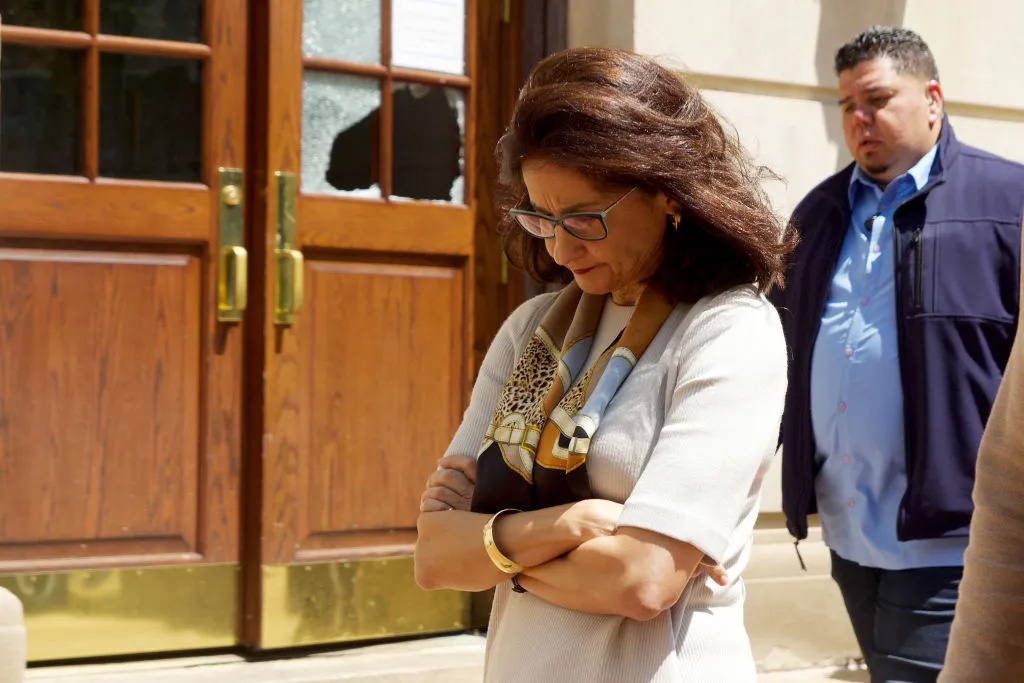Few will shed a tear at the news that Columbia University president Minouche Shafik is stepping down after months of criticism of her handling of campus protests over the war in Gaza. Her abrupt resignation — just a few weeks before the autumn semester is due to begin — brings to a close her turbulent thirteen-month reign at Columbia, one of America’s most prestigious educational institutions.
“This period has taken a considerable toll on my family, as it has for others in our community,” Shafik wrote in an email to staff and students. “It has also been a period of turmoil where it has been difficult to overcome divergent views across our community.” Perhaps some translation is called for, in order to understand what Shafik means by this word salad of an explanation for the reasons behind her decision to quit.
The phrase “divergent views” just won’t do to describe the ugly antisemitism, hatred and threats directed at Jewish students on Columbia’s campus. What Shafik calls “a period of turmoil” is something far worse. Columbia, an Ivy League institution based in New York, witnessed some of the fiercest campus protests of the summer. It was widely seen as the center of the student pro-Palestinian protests over the Israel-Hamas conflict, sparking similar demonstrations at universities across the US and elsewhere. Jewish students complained that they did not feel safe while the protests at times turned violent. Shafik ended up calling in the New York police department to restore order on campus. More than a hundred students were arrested and many more were suspended.
The episode marked the first time that mass arrests had been made on Columbia’s campus since Vietnam war protests more than fifty years ago. There was further controversy when several faculty members subsequently criticized Shafik’s crackdown on the demonstrators, with some walking out in support of students. The university was forced to cancel its commencement ceremony the following month. Much of the blame for this “turmoil” falls squarely on Shafik’s shoulders. In the midst of an unprecedented crisis, she appeared to lack the authority, principles or moral leadership to restore calm and order. It prompted the question how or why she had been appointed to head the university.
The downfall of Shafik points to a wider crisis across the American university sector. Campuses have been a flashpoint for Gaza protests since Hamas attacked Israel on October 7, and Israel’s subsequent incursion into the Gaza Strip. The problems are far from over, with questions growing about the quality of academic leadership. Seven university presidents have been summoned to appear before Congress over growing concerns about antisemitism being allowed to thrive on campus. Shafik is now the third of those seven to step down, joining former Harvard University president Claudine Gay and University of Pennsylvania president Liz Magill. They resigned following a widespread backlash over their handling of campus unrest and their congressional testimony, including a refusal to explicitly say that calling for the deaths of Jews could violate university policy. Instead there were endless equivocations. Shafik appeared before Congress in April where she too was accused of not doing enough to tackle antisemitism on campus. She tried to mount a defense of Columbia’s efforts, saying that the college was working to protect students. It was a far from convincing performance that only added to doubts about leadership of the university. The Republican House Speaker, Mike Johnson, a fierce critic of the pro-Palestinian protests on campuses, was quick to welcome the news of her resignation, describing it as “long overdue.”
Even so, it would appear to be onwards and upwards for Shafik, an Egyptian-born banker who was made a baroness in 2020. Her stellar résumé includes leading the London School of Economics, a stint as permanent secretary for the Department for International Development, deputy managing director at the International Monetary Fund and deputy governor of the Bank of England. In her resignation email, she said that she has a new role, working for Foreign Secretary David Lammy, “to chair a review of the government’s approach to international development.” This apparently involves working on fighting global poverty and promoting sustainable development, which Shafik describes as “areas of lifelong interest.” Columbia University’s loss would appear to be the Foreign Office’s gain. Believe that if you will.
This article was originally published on The Spectator’s UK website.


























Leave a Reply